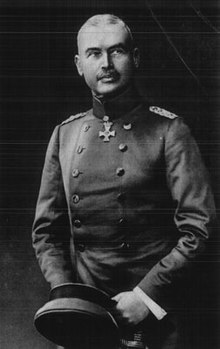Liman von Sanders
|
Dr. phil. h. c. Otto Liman von Sanders |
|
|---|---|

Generalleutnant Otto Liman von Sanders
|
|
| Birth name | Otto Viktor Karl Liman |
| Born |
17 February 1855 Stolp, Province of Pomerania, Kingdom of Prussia (today in Słupsk, Pomeranian Voivodeship, Poland) |
| Died | 22 August 1929 (aged 74) Munich, Bavaria, German Reich |
| Buried at | Darmstadt, Germany |
| Allegiance |
|
| Service/branch | Army |
| Years of service | 1874–1918 |
| Rank | General der Kavallerie |
| Unit |
|
| Commands held |
|
| Battles/wars | |
| Awards | Pour le mérite mit Eichenlaub |
| Spouse(s) |
|
| Relations | Isaac Nathan Liepmann (1762–1819) |
Otto Viktor Karl Liman von Sanders (17 February 1855 – 22 August 1929) was a German general who served as an adviser and military commander to the Ottoman Empire during the First World War. In 1918 he commanded an Ottoman army during the Sinai and Palestine Campaign.
Liman von Sanders was born in Stolp (now Słupsk) in the Pomerania province of the Kingdom of Prussia. He joined the military in 1874 and rose to the rank of General of Cavalry. In 1913, like several other Prussian generals before him (such as Moltke and Goltz), he was appointed to head a German military mission to the Ottoman Empire. For nearly eighty years, the Ottomans had been trying to modernize their army along European lines. Liman von Sanders would be the last German to attempt this task.
On 30 July 1914, two days after the outbreak of the war in Europe, the Ottoman leaders agreed to form an alliance with Germany against Russia, although it did not require them to undertake military action, and on 31 October 1914, the Ottoman Empire officially entered the war on the side of the Central Powers. Britain and France declared war on it on 5 November, and the Ottomans declared a jihad (holy war) later that month.
The first proposal to attack the Ottoman Empire was made in November 1914 by the French Minister of Justice Aristide Briand and was rejected. Later that month Winston Churchill, First Lord of the Admiralty, proposed a naval attack on the Dardanelles, based in part on erroneous reports of Ottoman troop strength. An initial attempt to force the Dardanelles by sea failed on 18 March 1915, due to gunfire from Ottoman forts on both sides of the strait. The Allies then turned to planning amphibious operations to capture the forts and clear the strait, which led to the Battle of Gallipoli.
...
Wikipedia
